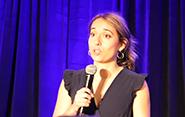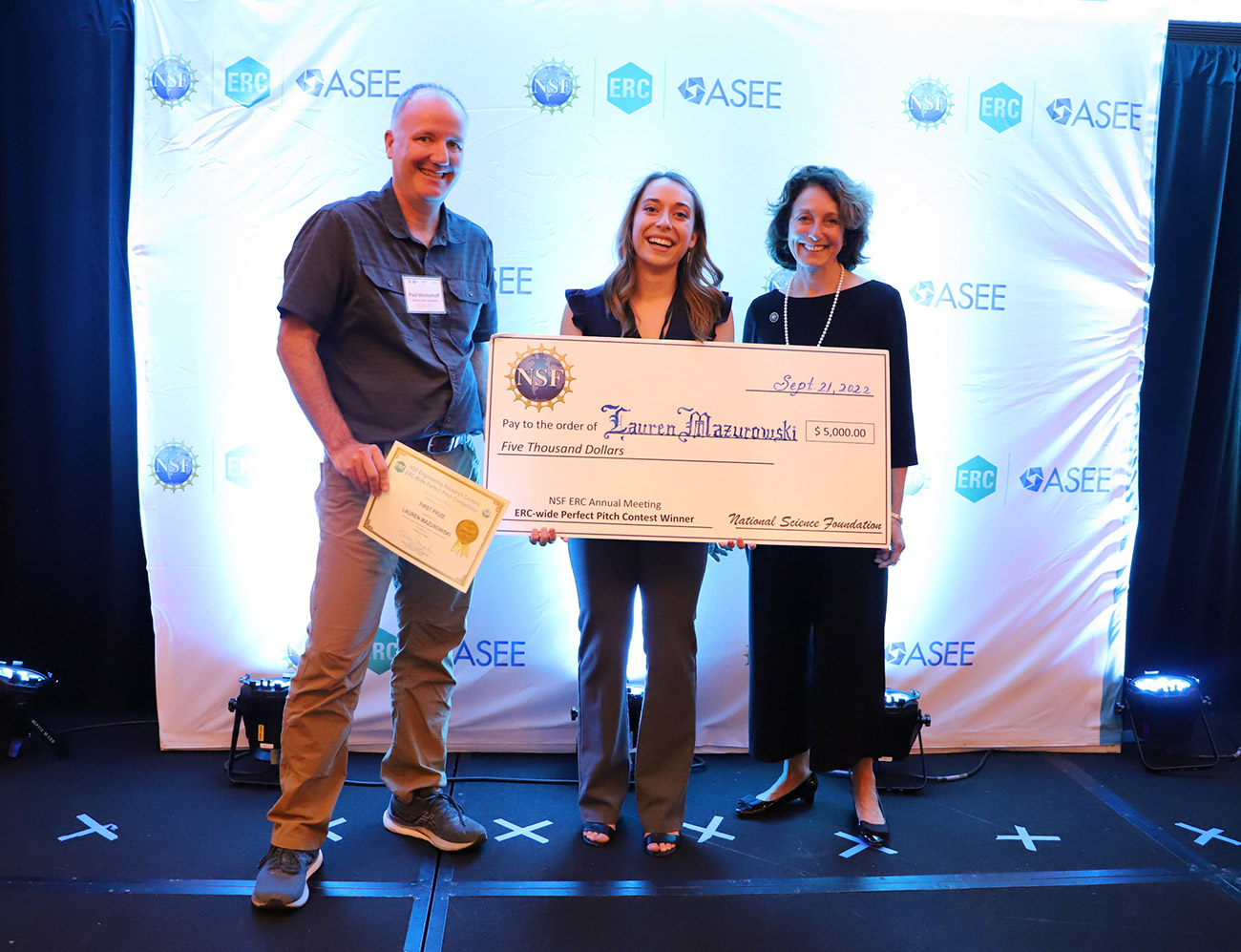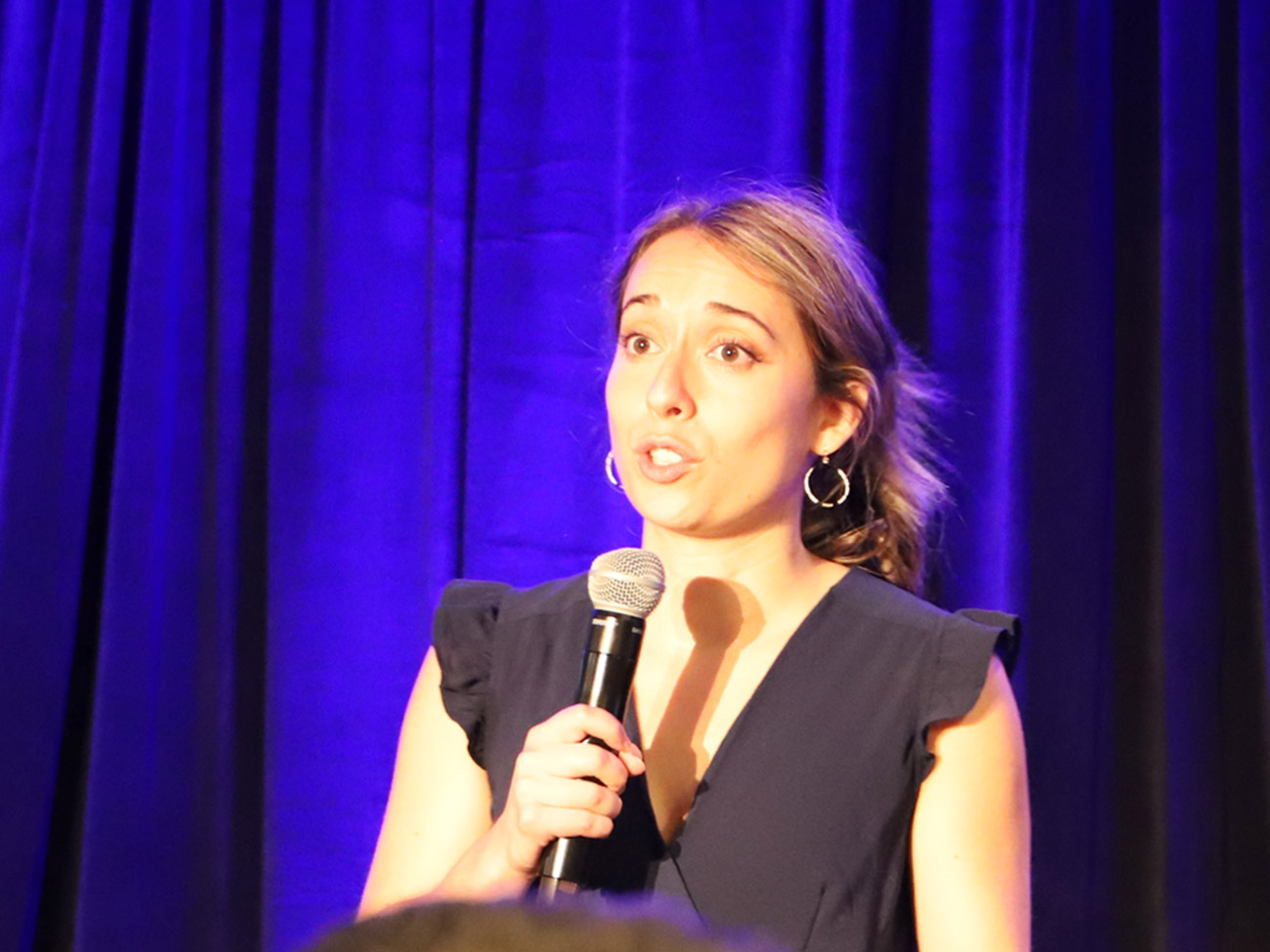EnvE Ph.D. Student Makes the Perfect Pitch

Lauren Mazurowski, a second-year Environmental Engineering Ph.D. student, placed first in the 2022 NSF Perfect Pitch Competition and received a cash prize of $5,000 for her presentation titled “Re[Cu]verCopper,” focused around recovering copper from industrial waste streams. She competed against finalists from 17 other NSF-funded Engineering Research Centers (ERCs) around the country.
 When she first heard about the local Perfect Pitch Competition, Mazurowski had just started her Ph.D. in Environmental Engineering at Yale a month earlier. In that time, she had joined the lab led by Dr. Menachem Elimelech to develop membranes, barriers that selectively allow different molecules to permeate through, for separation-based applications. As a first-year student, she worked under her senior mentor Ryan DuChanois to develop novel membranes that could be used for copper recovery applications.
When she first heard about the local Perfect Pitch Competition, Mazurowski had just started her Ph.D. in Environmental Engineering at Yale a month earlier. In that time, she had joined the lab led by Dr. Menachem Elimelech to develop membranes, barriers that selectively allow different molecules to permeate through, for separation-based applications. As a first-year student, she worked under her senior mentor Ryan DuChanois to develop novel membranes that could be used for copper recovery applications.
“Ryan had been part of a proposal for this work related to copper recovery,” Mazurowski said. [Copper recovery] is practical and pressing for millions of people today – if we want to globally transition to decarbonization, we must find a way to better source the materials needed to make that transition.”
Copper, widely used in construction, electronics, and other consumer products, is traditionally sourced from mining operations. As the electronics industry is predicted to grow exponentially in the next decade, industries are looking for alternative sources to extract copper. The membranes engineered by DuChanois and Mazurowski are designed to separate copper ions from other metals in nontraditional sources, such as semiconductor waste streams, copper-contaminated water sources, and tailings near mining sites. By recovering copper from the waste sites of traditional industrial processes, the team of researchers hope to develop a closed-loop process, increasing the availability of copper and reducing the environmental impact of the process.
“We’re using these membranes to pass through copper and ions of our interest, but reject all the other unwanted constituents,” Mazurowski said.
Some metals are almost identical in properties and simultaneously found in high concentrations within mining sites. As a result, the membrane developed by DuChanois and Mazurowski has a special coating, which takes advantage of each metal’s different affinity to capture constituents at different rates. The engineered membrane can preferentially reject unwanted metals, while allowing copper to selectively pass through.
The project is supported by the Nanotechnology for Enhanced Water Treatment (NEWT) research center, an NSF ERC spanning across four academic institutions with strengths in water treatment technology. NEWT hosts professional development opportunities to benefit researchers interested in academia, industry, or government. In September of 2021, DuChanois recommended Mazurowski for the Perfect Pitch Competition at NEWT, a biennial competition in which researchers have a visual aid and 90 seconds to pitch their research to a panel of judges. Though she was just starting in her program, she decided to participate.
“I think the organizers seemed hesitant for my entry since I was a first-year student,” Mazurowski said. When she contacted Ernie Davis, NEWT’s industry liaison, she was recommended to wait until later in her Ph.D. career, when she would be more familiar with her project, before participating in the Perfect Pitch Competition.
 However, Mazurowski saw the experience as an opportunity to develop her messaging abilities. “I thought it would be a good experience to work on my communication skills,” she said. “I wasn't expecting much out of it, at least in terms of winning. I just wanted it to be a learning experience.” As she developed her pitch in communications workshops, organizers from the NEWT Perfect Pitch Competition saw that the research she had collaborated on was marketable.
However, Mazurowski saw the experience as an opportunity to develop her messaging abilities. “I thought it would be a good experience to work on my communication skills,” she said. “I wasn't expecting much out of it, at least in terms of winning. I just wanted it to be a learning experience.” As she developed her pitch in communications workshops, organizers from the NEWT Perfect Pitch Competition saw that the research she had collaborated on was marketable.
“After I worked longer, Ernie saw that the pitch had more merit, and he was really helpful in workshops to improve the delivery,” Mazurowski said. “I was fortunate to be on a project with years of work already behind it.”
In December of 2021, researchers from Rice, University of Texas El Paso, Arizona State University, and Yale participated in the local NEWT Perfect Pitch Competition at Rice University. As part of the competition, researchers gave a 90-second pitch which incorporated a central problem, a proposed engineering solution, the broader impacts, and a call to action. There, Mazurowski received first place at the local NEWT Perfect Pitch Competition, winning $500 and advancing to the national NSF Perfect Pitch Competition.
Preparing for the national competition, Mazurowski continued to refine her pitch, tailoring it towards a broader audience.
“The first time I presented it was at NEWT,” she said. “All these people were familiar with terms like selective coating, polymer chemistry -- more field specific terminology. Ernie was helpful in identifying words that were overly jargon-y. We found terms that conveyed the same message, but could be conveyed to a broader audience.”
Last month, Mazurowski competed against other ERCs across the nation in the NSF Perfect Pitch Competition, hosted in Washington, D.C. Though she had rehearsed her talk countless times before, she remembers feeling nervous moments before she delivered the pitch.
“By the time I went over there, it was just muscle memory,” Mazurowski recalls. “I practiced it so many times, and it just spilled out of me, thankfully, or I probably would have choked up there! There were two bright spotlights, and I couldn't see anyone in the crowd. So, practicing can definitely be very useful!”
Later that night, she would discover that she had won first place. It is the first time a representative from NEWT and a student from Yale has ever won the national Perfect Pitch Competition.
She described the overall process of competing across two Perfect Pitch Competitions as motivating. As Mazurowski notes, marketing her own engineering research to industry leaders gave her work direction and purpose. She advises that all researchers in engineering academic research develop a short elevator pitch to inform colleagues, industry connections, or family members about their work.
“Everyone should have a pitch. In engineering, we should be doing work that is paramount to improving society. If you can't convince other people of your work, how can you convince yourself?” she says.
In the future, Mazurowski will continue developing the copper selective membranes to improve their economic feasibility. She currently serves on the NEWT Student and Postdoctoral Leadership Council as the Yale Outreach Chair and is excited to participate in future opportunities organized by NEWT. At Yale, she plans to participate in similar opportunities, such as the Three-Minute Thesis Competition, which has participants describe their thesis in three minutes to a general audience.
Mazurowski notes that the professors at Yale inspired her to see different opportunities as learning experiences. This philosophy, she notes, allows her to reframe challenging situations and setbacks in her work as opportunities.
“I think it was Dr. Judy Cha who told me, ‘Don't take yourself out of the running before other people do.’ I never expected I would make it this far in the competition, especially as a first/second-year. If there’s something you're genuinely excited about, you should always do it. It'll lead you to new opportunities, and, at the very least, you'll undoubtedly benefit from the experience.”
Kevin Pataroque (He/Him/His) is a second year Environmental Engineering Ph.D. student in the Elimelech Lab. A recent graduate of Case Western Reserve University, Kevin seeks to make scientific research accessible and relevant beyond the laboratory. His research areas include desalination processes, membrane technology, and clean water equity.

